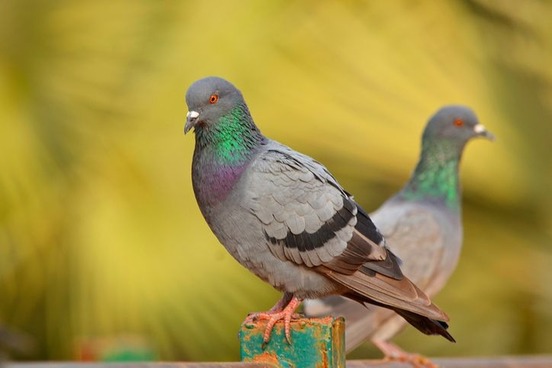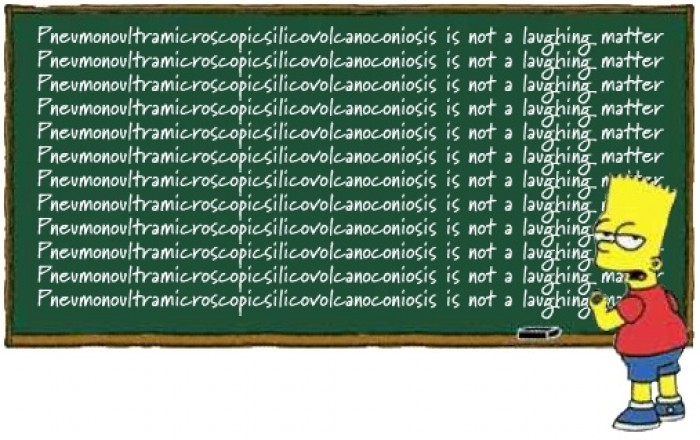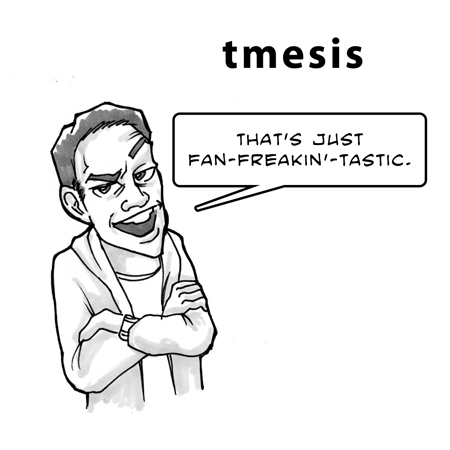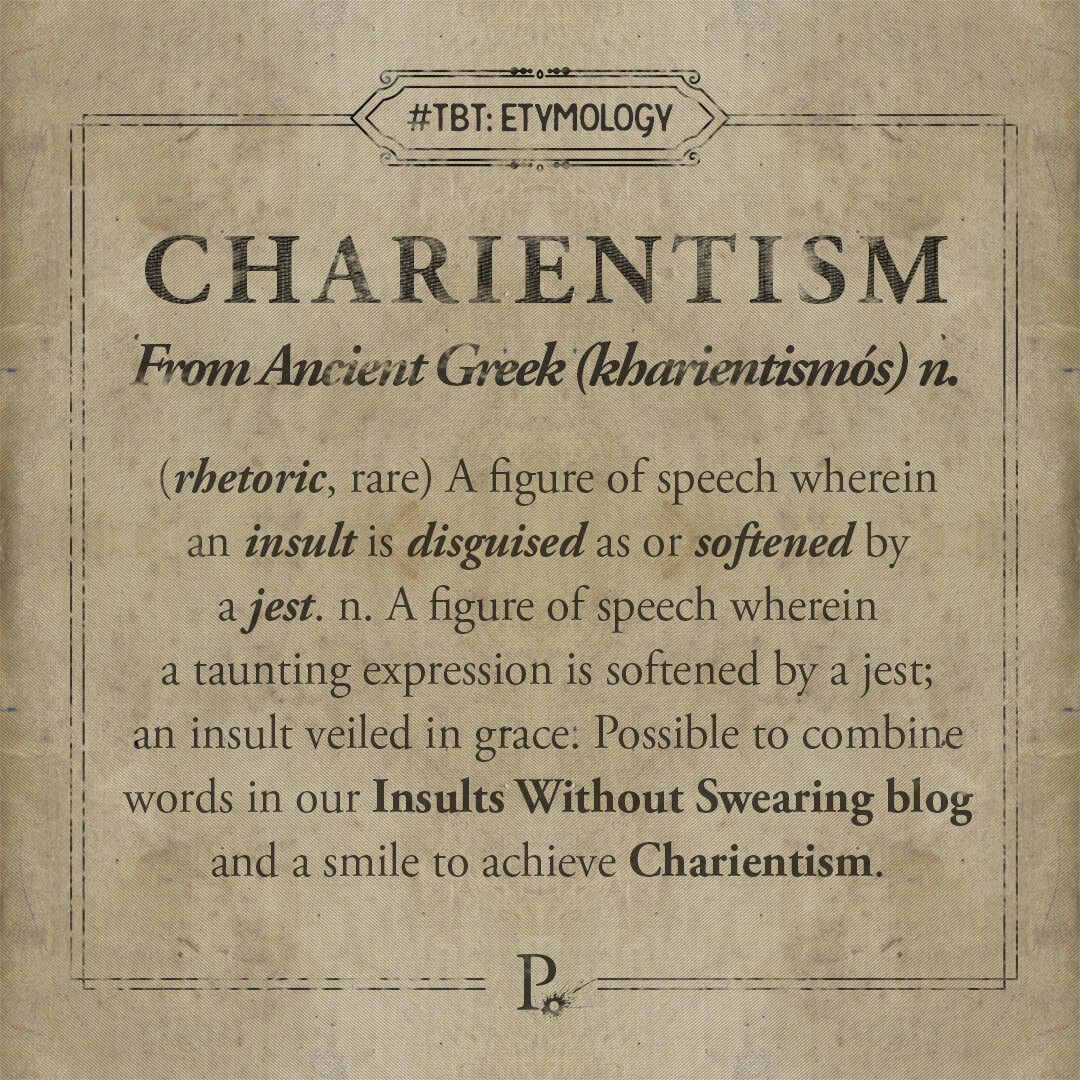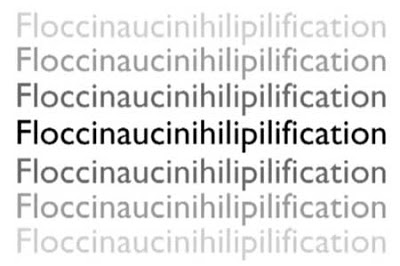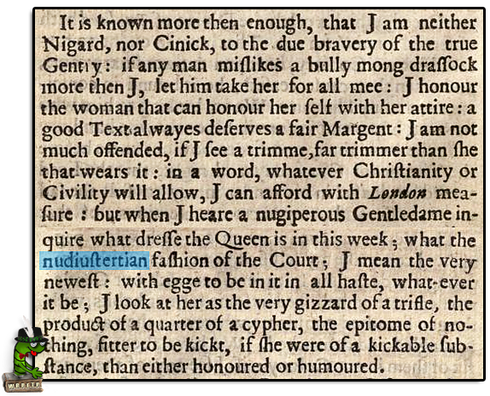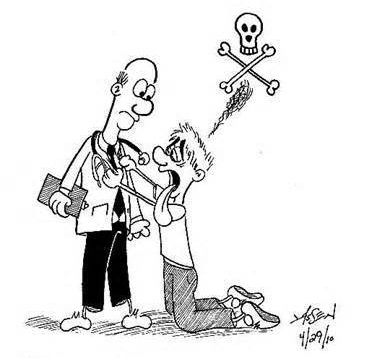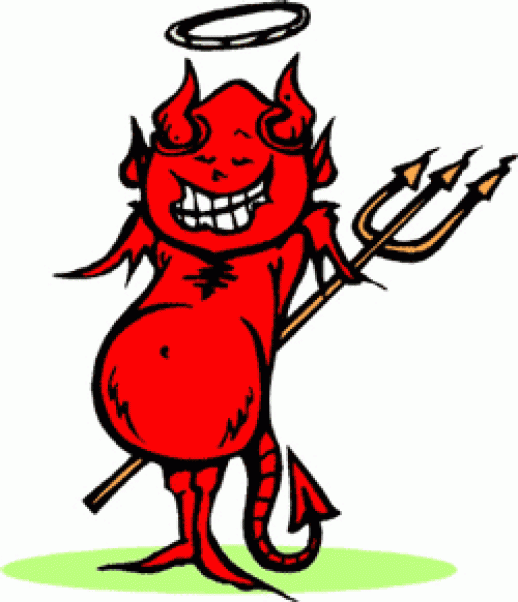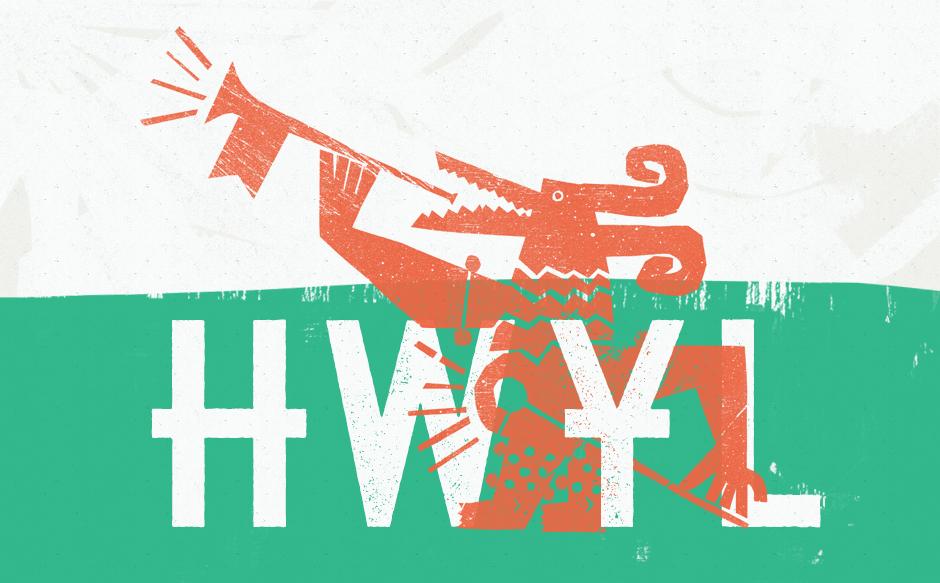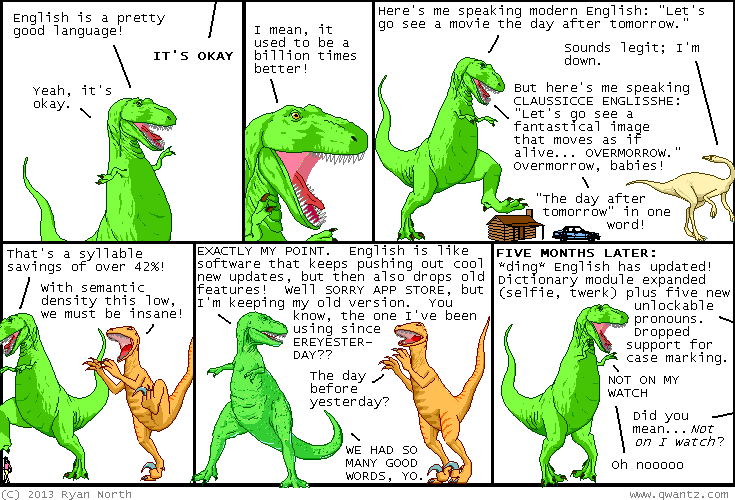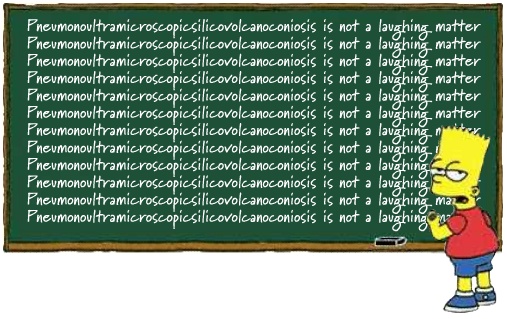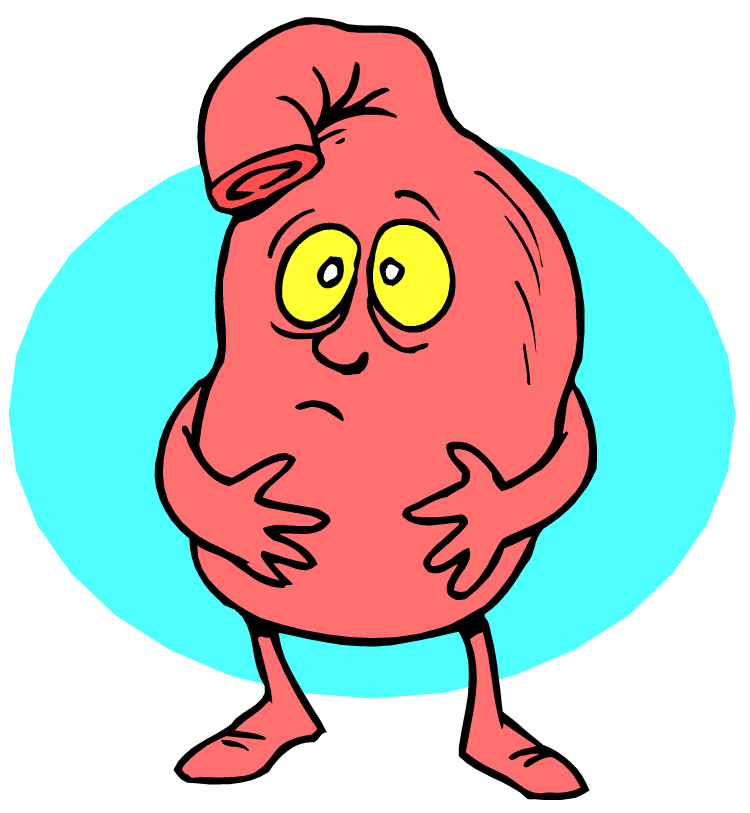Every language has a list of rarely used words that very few people know. They are not commonly known because they are rarely needed. Why bother learning something that you will not use..right? But for us, language nerds, that’s what gives meaning to our lives. Tracking down words and what they mean satisfies a curiosity that sits deep within us, whatever they mean. I wrote this article to satisfy that curiosity. So I brought to you 30 words that exist in English that you and other people probably don’t know. Don’t forget to share your favorites.
Nillionaire
Someone having little to no money.
Minimus
Your tiny toe or finger.
Serendipity
Finding something good without looking for it.
Quixotic
Unrealistically optimistic.
Caruncle
The triangular pink areas at the corner of your eyes.
Agelast
A person who never laughs.
Osculator
One who loves or one who is loved.
Callipygian
Having large, round, succulent buttocks.
Limerance
The state of being infatuated with someone.
Oxter
Armpit.
Atrate
Dressed in black.
Applepick
steal someone’s iPhone.
Axicolous
Something that lives on rocks.
Metanoia
Spiritual transformation.
Pauciloquent
Concise.
Jamais-vu
The feeling familiar is being encountered for the first time.
Laodicean
Indifferent.
Cacoethes
Bad idea.
Vaticinate
Predict.
Zoilism
Criticism.
Mephitic
Smelly.
Dysania
The state of finding it extremely difficult to get out of bed in the morning.
Febrile
Feverish.
Tittle
The dot over an “i” or a “j”.
Idoneous
Appropriate.
Kenspeckle
Recognizable.
Tergiversate
Equivocate.
Gigil
The irresistible urge to pinch or squeeze something cute.
Malarkey
Nonsense or balderdash.
Bravado
Someone who is full of false kind of courage that masks a hidden fear.
Do you know other words that people don’t know? Don’t hesitate to add them in the comment section. Have a bright day 🙂
The biblioklept holds her bounty tightly.
Definition: one who steals books
Biblioklept is, in at least some sense of the word, fairly useless. It is two syllables longer than book thief. It is also unlikely to be understood by some portion of the people with whom you use it, and so cannot be said to aid in communication. Happily, we do not have a merit based vocabulary, and words that are useless have the same rights of inclusion as do those that are useful.
Many eminent characters have been Biblioklepts.
—The Saturday Review (London, UK), 23 Oct. 1880
Acnestis
If you’ve got an itch on your acnestis, grab a back scratcher.
Definition: “The part of the back (or backbone) between the shoulder blades and the loins which an animal cannot reach to scratch” (Oxford English Dictionary)
This lovely word is not often found; one of the few dictionaries that does define it, the Oxford English Dictionary, notes that it is “rare in genuine use.” You may use this word in any fashion you see fit. In fact, your need of it doesn’t even need to be genuine.
With the stocks one assistant is sufficient. They are quite satisfactory for operations on the withers, the acnestis, the shoulders, the buttocks, and the tail.
—Louis A. Merillat, Veterinary Surgery, 1906
Meldrop
Does this cold medicine tackle meldrops?
Definition: “A drop of mucus at the nose, whether produced by cold or otherwise” (English Dialect Dictionary)
Meldrop used to be in Merriam-Webster dictionaries (it is included in the 1934 edition of our Unabridged, defined rather poetically as “a pendent drop, as of mucus at the nose, or of dew”). It is not in any of our current offerings. The word does not now have sufficient breadth of usage to merit inclusion, but if you want to see it get back in our dictionary make sure all your friends start using meldrop in published writing.
But looke againe on the other part of snotty nosd Gentlemen, with their drouping mustaches covering their mouth, and becomes a harbroy to meldrops, and a sucking sponge to al the watery distillations of the head, he will not spare but drinke with any bodie whatsoever, and after hee hath washed his filthie beard in the cup, and drawing out dropping, he wil suck the haire so hartily with his vnder lip.
—Simion Grahame, The Anatomie of Humors, 1609
Start a Twitter octothorpe trend.
Definition: the symbol #
The origins of octothorpe are shrouded in mystery; we are fairly certain that the word began being used in the early 1970s, but we do not know what led to the prefix for “eight” (-octo) being added to the component for thorpe (“thorpe”).
They could have done what the Dozenal Society is trying to do. The dozenals have banished 10 from their vocabulary. Instead, 10 is called dek and designated by an asterisk, *. Eleven is called el and designated by an octothorpe, #.
—Irene Virag, Newsday (Long Island, NY), 26 Oct. 1990
The face of a woman who just found out her favorite roller coaster is also a nauseant.
Definition: an agent that induces nausea
In the event that you ever find yourself feeling nauseated (or nauseous; either one is fine), say, perhaps by a meldrop clinging tenaciously to the nose of the person with whom you are speaking, it may prove useful to distract yourself with the knowledge that there is a word for the thing that makes you feel that way. Before you use the word loosely, you should know that nauseant is generally used in a medical sense, referring to a specific agent that causes nausea (and often is an expectorant, rather than just anything which turns your stomach).
Having thus, as we conceived, exhausted all the material medica, we turned to the second class, which is called atonics, and which we found to consist of blood-letting, issues and setons, nauseants, cathartics, gases, and abstinence.
—Monthly Review (London, UK), Nov. 1810
Time for a battle of math nerds and word nerds.
Definition: the first and second quantity in an addition of two things
Have you ever found yourself staring at a piece of paper with “3 + 4” written on it, and wondered ‘what is the proper term for each of these two respective quantities?’ No? The first number is the augend and the number that is added to it is the addend. You’re welcome.
If we ask what number increased by b gives c, we seek the augend.
—Hermann Schubert, The Monist (Chicago, IL), 1 Jan. 1893
I’m pretty sure there’s an obelus or two in the mix.
Definition: the symbol ÷
In addition to serving as the sign indicating division, the obelus is also used to mark a questionable passage of text. Our dictionary also uses it for matters of pronunciation. It should be noted that the entry for the word obelus itself has no obelus in it. However, you will find this division sign in a number of other entries, such as nuclear, where we list a pronunciation variant that is stigmatized (÷-kyə-lər).
The obelus, or division sign, is placed before a pronunciation variant that occurs in educated speech but that is considered by some to be questionable or unacceptable.
—Merriam-Webster.com
Harpists and people who use wrest pin in their daily conversation—both rare creatures.
Definition: a pin in a stringed musical instrument (as a harp, piano) around which the ends of the strings are coiled and by which the instrument is tuned
Nevermore will you have to gaze into the depths of a piano, and, much as one ponders the depths of one’s own soul, look at the pins that are wrapped tightly with coiled wire, and wonder ‘what do you suppose they call those things?’
N. B. The trade supplied with Pianoforte wire, wrest pins, hoppers, keys, felts, and every requisite for repairing Pianofortes.
—The Sydney Morning Herald (Sydney, NSW, Aus.), 16 Feb. 1853
Definition: a person who never laughs
The humorless agelast comes from the Greek word agélastos (“not laughing, grave, gloomy»), and not, as one might suppose, from the fact that spending any time around such a person feels like it lasts an age. Agélastos in turn comes gelân (“to laugh”), the same word that gives us gelastic («arousing or provoking laughter»).
Add to these a gift of irony—that confounder of the literalists and Agelasts—perfect self-possession and an imperturbable sang-froid, impenetrability of expression and purpose and the equipment of the Dandy seems to be complete.
— Temple Bar (London, Eng.), Apr. 1890
Amatorculist
Definition: «A little insignificant lover; a pretender to affection» (Samuel Johnson, A Dictionary of the English Language, 1755)
When one sees how pleased many people are to discover this word, one that finally will serve to provide an accurate description of some past lover, it is clear that amatorculist has not received the attention it deserves. The word is almost entirely unknown outside of dictionaries, and lexicographers seem to take a certain vicious glee in defining it. Joseph Wright, in his 1867 Dictionary of Obsolete and Provincial English defined the word as «A wretched lover or galant,» and Nathan Bailey, in his 1736 dictionary, referred to it as «a trifling Sweet-heart, a general Lover.»
If you are interested in the proper word to describe an insignificant love affair, rather than an insignificant lover, it is amourette.
Why, to tell you the truth, Squire Randal, as to the amatorculist, and his vertiginous gilt-piece of mutability, to such I have nothing to say, and with such I have nothing to do.
— James Hogg, Tales and Sketches, 1866
Pot-valor
Definition: boldness or courage resulting from alcoholic drink
The fancy way of saying liquid courage, pot-valor is the perfect word to describe how imbibing a few ounces of something can make a very bad idea seem like something you should definitely do right now. Unfortunately, when you are at the point when this word will be most applicable to you, chances are good that you will also be too drunk to remember what it is. Write it down on your arm before you go out tonight.
Againe, some cowards will so dare and bragge out a man in company, with such swaggering words, whereby the heaters should thinke there were not a better man to be found: and if it be in a Faire or Market, then he will draw his weapons, because he knoweth that he shall be soone parted, for the people will say, that such a one and such a one made a great fray to day, but I account this but pot-valour, or a Cowards fray to fight in the streete, for a man can giue no due commendations of manhood vnto such fighters, for there is no valour in it.
— Joseph Swetnam, The schoole of the noble and worthy science of defence, 1617
Definition: of or relating to pigeons
Pigeons get short-shrift in our stable of avian metaphors. We speak of someone with fine eyesight as eagle-eyed, and hawk lends itself to a variety of words (hawk-like, hawkish, etc.), but rarely do we compare anyone to the humble, intelligent pigeon. Truth be told, it is unlikely that you have a distinct need to use this word anytime soon, but if it happens we want you to be prepared.
Beside the poor, who, to misquote a scriptural phrase, are always in evidence, and the scarlet fever epidemic, which, thank goodness, is abating, London at this writing has a congress of the National Society of French Professors, an exhibition of the National Peristeronic Society and a fog—a fog with a big F.
— The Boston Herald, 29 Jan. 1888
Hirquiticke
Definition: «one past fourteene yeeres of age, beginning to bee moved with Venus delight» (Henry Cockeram, An English Dictionary, 1623)
For those of you who are unaccustomed to reading definitions written in the linguistic register of an early-17th century smarty-pants lexicographer, the meaning of the word above is, well, «horny teenager.» This gives us a very fine example of how occasionally the words for common things are themselves quite uncommon, as hirquiticke is extremely rare. It is uncertain where Cockeram found the word, as we have no evidence of actual use prior to 1623, although he may have borrowed it from Thomas Eliot’s Latin dictionary of 1538, which defined hirquitalus as «a chylde, whiche passeth the age of xiiii yeres, and begynneth to be styrred with lechery.»
The Latin word for «he-goat» is hircus, from which we get hircine («of, relating to, or suggestive of a goat; especially: resembling a goat in smell»). Occasional writers have used a variant of this root to make fanciful nonce-words based on the goat’s reputed libidinousness.
To speak of her hirquitalliency at the elevation of the pole of his Microcosme, or of his luxuriousness to erect a gnomon on her horizontal dyal, will perhaps be held by some to be expressions full of obscœness, and offensive to the purity of chaste ears.
— Thomas Urquhart, Ekskybalauron, 1652
More Obscure Words
We strive to bring you the rarest words possible.
VIEW ALL >
Language isn’t just a medium of communicating your thoughts, feelings, and ideas. It’s a whole different world in itself. Language shapes our perception, personality, and passion.
There’s a word for almost every feeling that you feel. There’s a word for almost everything that you see. There’s a word for almost everything you can think of. Every word for sure carries a certain beauty and uniqueness describing really incredible things.
More than a million words are there in the English language. Many of them have faded, many of them aren’t much used. And nearly 171,476 words are commonly used in the current scenario. The infrequently used words belong to psychology, biology, medicine, astronomy, and other fields. They remain in a state of vernacular obscurity because of their extraordinary specificity.
Neither heard nor spoken on a regular basis, these are 25 fascinating rare words that are a delightful addition to your vocabulary and also appealing to the senses and the English language.
1. Tmesis (tuh-mee-sis)
Source = Amazonaws
An unusual word with an unusual meaning, ‘tmesis’ is the only word in English that begins with ‘tm-’.
What it means: Insertion of one or more words to make a compound word
Etymology: The word ‘tmesis’ originates from the Greek tmesis «a cutting», related to temnein which means «to cut».
Example sentences:
- ‘to’ inserted in ‘update’ makes for ‘up-to-date’
- ‘so’ inserted in the middle of ‘whatever’ makes for ‘whatsoever’
- ‘Whole’ inserted in the ‘another’ makes for ‘a whole nother’
2. Syzygy (siz-i-jee)
Source = Giphy
The word ‘syzygy’ is as rare, beautiful and unique as is its astronomical occurrence. This is the only word in all of English to have three Y’s.
Moreover, other than astronomy, it has different meanings in poetry, genetics, psychology, medicine, mathematics, zoology and astronomy. Bonus fact is that it’s also one of the high-scoring Scrabble words.
Different meanings in different fields:
- Astronomy: An alignment of three celestial bodies more commonly the Sun, Earth, and Moon akin to an eclipse.
- Genetics: The pairing of chromosomes in meiosis.
- Mathematics: A relation between generators of a module.
- Medicine: The fusion of some or all organs.
- Poetry (in classical prosody): The combination of two metrical feet into a single unit.
- Psychology: A quintessential pairing of contrasexual opposites which symbolizes the communication of the conscious and unconscious minds.
- Zoology: The association of two protozoans for the purpose of asexual exchange of genetic material.
Etymology: The word derives via late Latin from Greek suzugia «yoke of animals, pair, union of two, conjunction» from suzugos «to yoke together». It is the compound form of syn «together» + zygon «yoke».
Example sentences:
- The moon is at syzygy when full.
- The planets were aligned in syzygy. (3.1)
3. Hydroxyzine (hahy-drok-suh-zeen)
Source = Nih
Hydroxyzine is the only word to have X, Y, Z back-to-back and in-order. The first known use of this medicine was back in 1956. It can help you relieve tension, irritability and anxiety.
Meaning: A tranquilizing drug used to cure anxiety and motion sickness.
Etymology: hydroxy- + (pipera)zine
Example sentence: Do not use Hydroxyzine for alcohol withdrawal!
4. Philodox (FIL-uh-doks)
Source = Pinimg
‘Phil-’ is the root word used to define love for something and ‘dox’ means beliefs and praise. So someone who loves his own opinions is a philodox.
What it means: A dogmatic person who loves his or her own opinions.
Etymology: From Middle French philodoxe, from Ancient Greek (philódoxos, “opinion-loving”). It is a compound of (phílo-, “philo”) + (dóxa, “glory; opinion”).
Example sentence: Once again, it was a joy to see and meet those that really make a difference in the security market, believe me, life isn’t short of philodox characters… (Security News Desk)
5. Dextrosinistral (deks-tro-sin-is-tral)
Source = Whstatic
Lefties or left-handed people are often asked (and sometimes forced) to switch their handedness and become a right hander. Those who’re trained to become one are called ‘dextrosinistral’.
Meanings:
1. Moving or extending from right to left
2. A natural left-handed person trained to use the right hand (3.2)
Etymology: (dextro- + sinistral) From the Latin ‘dexter’ meaning right and ‘sinister’ meaning left.
Example Sentence: The maximum deformation was mostly in the dextrosinistral direction.
6. Lalochezia (lah-loh-KEY-zee-uh)
Source = Oxfamblogs
When you’re in a state of extreme anger and spew filthy or indecent words from your mouth, the emotional relief you gain by doing that is called lalochezia.
Meaning: Emotional relief gained using expletives or abusive language (3.3)
Etymology: From the Greek ‘lalia’ meaning speech and ‘chezo’ meaning to relieve oneself.
Example Sentence: But you can build up a tolerance to lalochezia—the more you swear, the less it helps. (Greatist)
7. Gargalesthesia (gar-guhl-es-thee-zee-yah)
Source = Giphy
It’s the sensation you feel when your sensitive areas are ticked really hard and repeatedly.
Meaning: The sensation caused by being tickled.
Etymology: A compound of the Greek ‘gargalos’ meaning itching and ‘aesthesia’ or ‘esthesia’ meaning ability to perceive sensations.
Example sentence: Gargalesthesia has been known to cause death when prolonged.
8. Factotum (fak-toh-tuh m)
Source = Modworkshop
A factotum is someone who possesses diverse traits and serves different responsibilities. And that makes him/her jack of all trades.
Meanings:
- A person having many diverse activities or responsibilities.
- A general servant.
- A jack of all trades.
- An individual employed to do all kinds of duties.
Etymology: From the Latin ‘facere’ meaning to do and ‘totum’ meaning everything. (3.4)
Example sentence: By day three, it was the department’s triumph and I was a factotum. (Jack Kerley, THE HUNDREDTH MAN)
9. Charientism (ka-ri-yent-izm)
Source = Theprose
When you’re having a group chat and don’t understand whether something was a quip or a disdain, it’s charientism. It is an artfully concealed insult.
Meaning: A figure of speech wherein an insult is disguised as or softened by a jest.
Etymology: From Ancient Greek (kharientismós)
Example sentence: I’d offer up a charientism but I’m not polite enough to bother masking my dislike for people.
10. Manque (man-que, ma-nq-ue)
Source = Blogspot
When you feel unfulfilled or frustrated for not living up to a certain expectation or ambition, it’s called manque.
Meaning: would-be; unfulfilled realizing an ambition or capability due to the vagary of circumstance, some inherent flaw, or an often uncertain constitutional lacking of some kind.
Etymology: From French manqué (to lack)
Example sentence: The manager is an actor manqué.
11. Floccinaucinihilipilification (FLOK-si-now-sin-ih-HILL-ip-il-IF-i-CAY-shun)
Source = Englishbookgeorgia
Damn hard to pronounce, this 29-letter-long word happens to be one of the longest words in the English language. With the meaning ‘categorizing something as valueless, the humorously paradoxical fact about the word is that it is quite a useless word in itself; which is hardly used anywhere except as an example of a long word.
Meaning: the action or habit of estimating something as worthless (3.5)
Etymology: From a combination of four Latin words: flocci, nauci, nihili, pili (meaning ‘hold at little value’)
Example sentence: Floccinaucinihilipilification is one of a number of very long words that occur very rarely in genuine use.
12. Nudiustertian (noo-dee-uhs-TUR-shuhn)
Source = Wordsandphrasesfromthepast
According to the Oxford English Dictionary, the word ‘nudiustertian’ has been mentioned only in the very popular work ‘The Simple Cobbler of Aggawam in America’ written by Nathaniel Ward.
Meaning: very recent, the day before yesterday
Etymology: From Latin ‘nudius tertius’, from phrase nunc dies tertius est meaning ‘today is the third day’. (3.6)
Example sentence: When I hear a‥Gentledame inquire‥what [is] the nudiustertian fashion of the Court; I mean the very newest. (The Simple Cobbler of Aggawam in America)
13. Pandiculation (pan-dik-oo-lay-shun)
Source = Somaticmovementcenter
Whenever you feel drowsy or weary, just stretch your limbs and neck and accompany it with yawning. This simple and effective movement is called pandiculation. It helps to reboot your brain’s sensation and also restores complete muscle function.
Meaning: yawning and stretching (as when first waking up)
Etymology: From Latin pandiculari, from pendere to stretch
Example sentence: Instances of pandiculation in the audience suggests the show isn’t going well.
14. Valetudinarian (val-i-too-duh-NAYR-ee-uhn)
Source = Digopaul
Someone who is constantly obsessed about his or her health is called a valetudinarian. It is used as both a noun and an adjective.
Meaning: a sickly or weak person, especially one who is constantly and morbidly concerned with his or her health
Etymology: The word comes from Latin valētūdinārius, from valetudo (“state of health, health, ill health”), from valere (“to be strong or well”)
Example sentences:
1. A «valetudinarian» is a 10-dollar word for someone who is sickly.
2. The valetudinarian habit of discussing his health had grown on Rose…
15. Schadenfreude (shah-den-froydah)
Source = Dailydubie
When someone feels malicious enjoyment from observing someone else’s misfortune, that feeling is schadenfreude.
It is the synonym of another rare word ‘epicaricacy’. This word became popular in English in the late 20th century. Its usage was seen in an episode of ‘The Simpsons’.
Meaning: satisfaction or pleasure felt at someone else’s misfortune malicious enjoyment derived from observing someone else’s misfortune
Etymology: The word was borrowed from German Schadenfreude (“joy in the misfortune of others”), from Schaden (“damage, harm, mishap”), and Freude (“joy”).
Example sentence: And Mr. Henry’s arrival suggests the schadenfreude is over.
16. Chthonic (thon-ik)
Source = Publicationcoach
What dwells beneath the earth’s surface is chthonic.
Meaning: of or characteristic of the mythological underworld, subterranean (3.7)
Etymology: From Ancient Greek khthonios (of the earth), from khthōn, earth
Example sentence: The young pantheon had remanded their elders to the role of smoldering, chthonic gods……
17. Hwyl (HU il)
Source = WordPress
That’s a stirring and motivational energy that one experiences when he/she is all pumped up and determined to achieve a particular goal or ambition.
Meaning: emotional fervor (as in the recitation of poetry), a melodic chanting style of Welsh preaching.
Etymology: Welsh
Example sentence: We will never lack hwyl on the second Gwlad of an international day anthem…..
18. Lethologica (Leth-Oh-LOGE-ikuh)
Source = WordPress
If you are unable to recall the exact word for something, you have a lethologica.
Meaning: the inability to remember the accurate word for something
Etymology: Carl Jung coined this word from the Ancient Greek lḗthē meaning forgetfulness and lógos meaning word.
Example sentence: You might have trouble recalling that lethologica is the inability to remember a word.
19. Overmorrow (oh-vuhr-MOR-oh)
Source = Qwantz
The day that is two days ahead of today is ‘overmorrow’.
Meaning: the day after tomorrow.
Etymology: The word comes from Middle English overmorwe. It is a compound of over + morwe (“morrow”).
Example sentence: ‘Does overmorrow work for you?’
20. Velleity (vuh-LEE-i-tee)
Source = Netdna-cdn
A mere wish with no strong desire to act is called ‘velleity’.
Meanings:
1. The weakest degree of desire or volition.
2. A slight wish with no effort to act.
Etymology: From Medieval Latin velleitās, from Latin velle (“to wish or will”). (3.8)
Example sentence: He felt cast out … divorced from the caprices and the velleities of childhood.
21. Sesquipedalian (ses-kwi-pi-DAYL-yuhn)
Source = Blogspot
A word that is one and a half feet long is called ‘sesquipedalian’.
Meanings:
1. Given to or characterized by the use of long words, long-winded.
2. Having many syllables; polysyllabic. (3.9)
Etymology: The word came into existence in the mid 17th century, 1656 to be precise. It originated from Latin sesquipedalis ‘a foot and a half long,’ from sesqui- (see sesqui-) + pes, ped- ‘foot’.
Example sentence: Anne, that ridiculously sesquipedalian word you just gutturally uttered is a perfect example of why Germans don’t play Scrabble.
22. Borborygmus (bor-buh-RIG-muhs)
Source = Stomachnoises
Being an onomatopoeic word, the word ‘borborygmus’ imitates the annoying, loud gurglings made by the stomach. Chances are you’ve never heard of this word unless you’re a gastroenterologist.
Meaning: rumbling or gurgling sound caused in intestines and stomach by moving fluid or gas (3.10)
Etymology: Originated in the early 18th century, the word was originated from modern Latin, from Greek borborygmos, from borboryzein (to rumble)
Example sentence: Unfortunately sir the other guests are trying to listen to the singer but your borborygmi (plural) are so loud they are interrupting the performance.
23. Doohickey (duːhɪki)
Source = Gstatic
Open your childhood treasure of toys, and you’ll discover so many objects & gadgets whose name you wouldn’t know or recall. Those gadgets are doohickeys.
Meaning: a small object or gadget, especially one whose name the speaker doesn’t know or can’t recall.
Etymology: The word’s origin lies in the 20th century. It is a blend of doodad and hickey.
Example sentence: This garage is filled with electronic parts and other valuable doohickeys.
24. Higgler (higgl-ůr)
Source = WordPress
Someone who goes around selling small items is known as a higgler.
Meanings:
- a person who travels around selling small items; a pedlar.
- a person who haggles or negotiates for lower prices.
Etymology: probably an alteration of haggle
Example sentence: But while she still lived and prospered as a higgler we had to find another helper to fill.
25. Contronym (KAHN-troh-NIM)
Source = WordPress
Also known as contranym or autoantonym, a contronym is a word with two meanings having opposite meanings. For e.g. sanction (meaning both ‘a penalty for disobeying a law’ and ‘official permission or approval for an action’).
Meaning: a word with two opposite meanings
Etymology: a combination of contra- and -onym, on the pattern of synonym and antonym
Example sentence: The word contronym is a recently coined neologism.
Do you also know a rare word in English or any other language? If you do, then do tell us the word with its meaning in the comments section below!
Rewrite the following sentences, adding, deleting, or changing periods, question marks, exclamation points, and commas as necessary.
EXAMPLE: My best friend has moved to 9782 , Revere Avenue, New York NY 10465-2879
My best frieñ has moved to 9782 Revere Avenue, New York, NY 10465-2879.
When they went to the prom did Martha wear a lavender gown with blue satin ribbons and did George wear a light gray tuxedo
If you want to enrich your English vocabulary with new words, check out Unused Words. It is a website that contains rarely used English words and presents a new set of words on its page every day. Refresh the page to see a new word or browse words by category — nouns, verbs, adjectives, adverbs etc. You can also subscribe by email to get a new word everyday in your inbox.
Definion for every word contains its origin, the reason to use it and how to use it. You can comment (via Facebook login) or view comments of other users. Every word also has tags, so you can view related similar words by clicking on a tag.

Features:
- Browse rarely used words from English dictionary
- Browse words by category (nouns, verbs, adjectives, adverbsor, slang) by tags
- OED rejected words — words that did not make into the official Oxford English Dictionary
- Subscribe by email to receive a new word every day
- Follow on Facebook, Twitter or by RSS
- Similar tools: Phrays, Exemplar, Artwiculate, VocabSushi and WordSpy
Check out Unused Words @ [No Longer Available]












